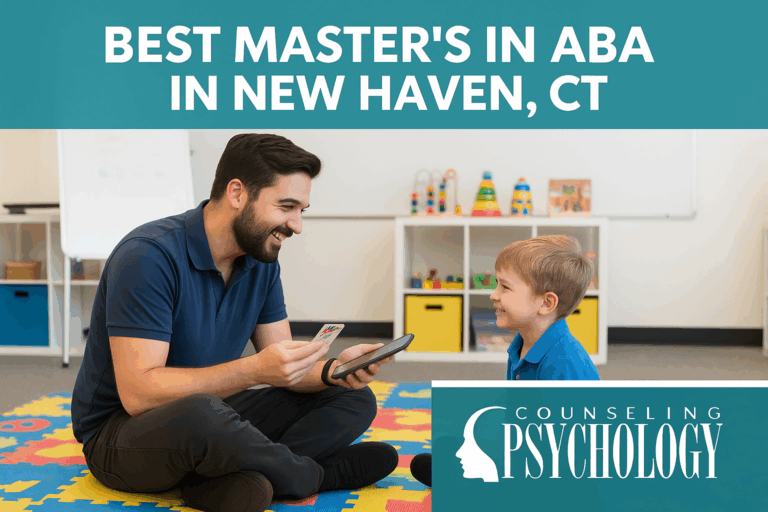Best Master’s in Applied Behavior Analysis (ABA) Near New Haven, CT

For those passionate about helping individuals with autism, developmental disabilities, or behavioral challenges, earning a Master's in Applied Behavior Analysis (ABA) offers a path to a rewarding and impactful career. The New Haven area provides both academic excellence and hands-on clinical training opportunities across Connecticut's thriving healthcare and education systems.
Whether you're pursuing Board Certified Behavior Analyst (BCBA) certification or seeking advancement in behavioral health or special education, New Haven's academic institutions and clinical networks offer an ideal learning environment.
In this article, you'll learn:
- What to expect from ABA master's programs in and near New Haven, CT
- Common admissions requirements and what schools look for
- Examples of local practicum and clinical training sites
- Career paths and Connecticut employers that hire ABA graduates
- Tips on funding your education and gaining BCBA certification
2026 Best Master's in Applied Behavior Analysis Near New Haven, CT
Western Connecticut State University
Danbury, CT - Public 4-Year - wcsu.edu
Master's - Master of Science in Applied Behavior Analysis
Online Learning - Visit Website
Western Connecticut State University's Master of Science in Applied Behavior Analysis is a 30-credit online program designed for BCBA certification preparation. The curriculum covers behavior principles, ethics, research methods, and intervention strategies, aligning with BACB standards. Admission requires a bachelor's degree with a 2.8 GPA, resume, and essay; no entrance exam is mentioned. The program includes a comprehensive exam and does not accept transfer credits, offering flexibility for working professionals through its online format.
- 30-credit online program.
- Prepares for BCBA certification.
- Flexible for working professionals.
- Admission requires 2.8 GPA.
- Curriculum aligned with BACB standards.
- Covers ethics and intervention strategies.
- No transfer credits accepted.
- Comprehensive exam required.
- Courses in behavior assessment.
- Focus on research methods.
University of Saint Joseph
West Hartford, CT - Private 4-year - usj.edu
Master's - Applied Behavior Analysis, M.S.
Campus Based - Visit Website
The University of Saint Joseph's M.S. in Applied Behavior Analysis equips professionals with advanced skills in behavior assessment, intervention strategies, and ethical practices across diverse settings. This campus-based program prepares graduates for the BCBA® Examination through a curriculum that includes research methods and capstone projects. Admission requires a 3.0 GPA, professional recommendations, and a personal essay, with no entrance exam specified. The program offers flexible two- or three-year tracks and emphasizes practical application, ensuring readiness for challenging roles in behavior analysis.
- Prepares for BCBA® Examination.
- Focus on practical application.
- Comprehensive curriculum.
- Admission requires 3.0 GPA.
- Includes capstone projects.
- Covers ethical practices.
- Emphasizes research methods.
- Two or three year tracks.
- Requires personal entrance essay.
- Immunization records needed.
Master's - Master of Science in Autism and Applied Behavior Analysis (Autism)
Campus Based - Visit Website
Focusing on Autism Spectrum Disorders, this M.S. in Autism and Applied Behavior Analysis at the University of Saint Joseph integrates specialized autism training with BACB-approved coursework. Students gain expertise in evidence-based practices and hands-on learning, preparing for the BCBA exam. Admission mandates a 3.0 GPA, letters of recommendation, and a letter of intent, with no entrance exam mentioned. Financial aid and graduate assistantships are available, supporting careers dedicated to improving the lives of individuals with autism through ethical and professional behavior analysis.
- BACB-approved curriculum
- Focus on Autism Spectrum Disorders
- Hands-on learning opportunities
- Ethical and professional training
- 3.0 GPA requirement
- Letters of recommendation needed
- Letter of intent required
- Financial aid available
- Graduate assistantships offered
- Fall and spring entry options
Master's - Autism and Applied Behavior Analysis, M.S. (Autism)
Campus Based - Visit Website
Designed for professionals targeting Autism Spectrum Disorders, the University of Saint Joseph's M.S. in Autism and Applied Behavior Analysis blends rigorous behavior analysis principles with autism-specific strategies. The curriculum covers research methods, ethical issues, and evidence-based practices, meeting BCBA exam requirements. Admission requires a 3.0 GPA, letters of recommendation, and a letter of intent, with no entrance exam noted. Thesis research and graduate assistantships enhance this campus program, fostering impactful careers in autism support through comprehensive training.
- Campus-based program
- Focus on Autism concentration
- Meets BCBA exam requirements
- 3.0 GPA admission requirement
- Letters of recommendation needed
- Comprehensive curriculum
- Includes thesis research
- Fall and spring entry
- Graduate assistantships available
Southern Connecticut State University
New Haven, CT - Public 4-Year - southernct.edu
Master's - Applied Behavior Analysis, M.S.
Online & Campus Based - Visit Website
Southern Connecticut State University's Applied Behavior Analysis M.S. program employs a hybrid learning model, combining online coursework with campus-based sessions for flexibility. This 30-credit curriculum emphasizes ethical practices, organizational behavior management, and evidence-based intervention strategies, preparing graduates for diverse ABA careers. Core courses include Principles of ABA and Single Subject Research Methods, supplemented by elective fieldwork opportunities. A 3.0 cumulative GPA is required for graduation, and the program culminates in a comprehensive exam capstone. Financial aid and transfer credit options are available, making it accessible for working professionals. No entrance exam is required for admission.
- Hybrid learning format
- 30 credits required
- 3.0 GPA for graduation
- Core ABA courses
- Elective fieldwork options
- Financial aid available
- Transfer credits accepted
- Comprehensive exam capstone
- Ethics and professional conduct
- Organizational behavior management
Why Study Applied Behavior Analysis Around New Haven?
New Haven, home to Yale University, Southern Connecticut State University (SCSU), and Albertus Magnus College, sits at the heart of Connecticut's behavioral healthcare and education network. The city blends the academic rigor of a university town with clinical and community-based opportunities throughout New Haven County.
Key reasons to study ABA in New Haven include:
- Strong institutional partnerships: Local universities often partner with hospitals, clinics, and school districts for supervised fieldwork.
- Access to diverse populations: Students gain experience serving children, adults, and families across urban, suburban, and rural settings.
- Career opportunities statewide: Graduates work in healthcare systems, autism treatment centers, early intervention programs, and private practices across Connecticut.
Discover other psychology programs in Connecticut.
Admissions & Enrollment
While requirements vary by program, most Connecticut ABA master's programs share similar core expectations.
Typical admission requirements:
- Bachelor's degree in psychology, education, or a related field
- GPA of 3.0 or higher (some programs may accept conditional admission)
- Prerequisite courses in psychology, learning, or research methods
- Statement of purpose highlighting interest in behavioral science and career goals
- Letters of recommendation from academic or professional references
- Resume or CV demonstrating relevant experience (such as work with individuals with disabilities)
Local tip: Highlight your interest in Connecticut's behavioral health needs, especially autism services, early intervention, and school-based programs. This helps demonstrate regional commitment and aligns with many New Haven institutions' missions.
Learn more about Applied Behavior Analysis programs.
Curriculum and Learning Experience
A master's in ABA combines theory, research, and practical application. Programs prepare students to meet the Behavior Analyst Certification Board (BACB) standards and often include verified course sequences (VCS) aligned with BCBA eligibility.
Typical coursework includes:
- Principles of Behavior and Learning
- Behavioral Assessment and Intervention
- Ethics for Behavior Analysts
- Research Design and Data Analysis
- Autism Spectrum Disorders and Developmental Disabilities
- Supervised Field Experience / Practicum
Most programs near New Haven offer part-time and full-time formats, often accommodating working professionals. Hybrid and online components are increasingly common, allowing flexibility without compromising practicum quality.
Practicum and Clinical Training Opportunities
Fieldwork is a critical part of ABA training. Students near New Haven benefit from a rich network of local agencies and schools offering supervised practicum placements.
Examples of clinical and practicum sites:
| Type of Site | Example Locations | Focus Areas |
| Autism Clinics | ACES Autism Program (North Haven) | Early intervention, behavioral therapy, parent training |
| Hospitals & Health Systems | Yale New Haven Hospital, Bridgeport Hospital, Connecticut Mental Health Center | Inpatient and outpatient behavioral health, developmental evaluation |
| School Districts | New Haven Public Schools, Hamden Public Schools, Milford Public Schools | Classroom-based interventions, IEP support, data-driven instruction |
| Community & Nonprofit Agencies | The Kennedy Collective (Bridgeport), Benhaven (New Haven) | Adult services, residential and vocational ABA programs |
| Private Practices | Connec-to-Talk (Orange), Applied Behavior Institute | 1:1 therapy, social skills groups, caregiver coaching |
Students gain experience across diverse populations and settings, allowing them to meet the BACB's supervised fieldwork requirements (typically 1,500–2,000 hours).
New Haven ABA Master's Programs Overview
| Feature | What to Look For | New Haven–Area Insights |
| Accreditation | Verified Course Sequence (VCS) approved by BACB | SCSU and Albertus Magnus College both feature BACB-aligned programs |
| Delivery Format | On-campus, hybrid, or online options | Many offer flexible schedules for working professionals |
| Practicum Support | Faculty-arranged or student-secured placements | Local networks include Benhaven, ACES, and Yale-affiliated clinics |
| Faculty Expertise | Instructors with BCBA or BCBA-D credentials | Regional faculty often specialize in autism, special ed, and behavioral research |
| Capstone/Thesis | Applied project or empirical study | Many programs link projects to local clinical sites or agencies |
Career Paths for ABA Graduates in Connecticut
Graduates of ABA master's programs are qualified for Board Certified Behavior Analyst (BCBA) certification and may pursue roles across healthcare, education, and private practice.
Common career titles:
- Board Certified Behavior Analyst (BCBA)
- Behavioral Consultant or Interventionist
- Clinical Supervisor
- School Behavior Specialist
- Autism Program Director
- Research or Policy Analyst
Top employers near New Haven include:
- Yale New Haven Health System – behavioral medicine and developmental pediatrics
- Benhaven – autism and community living programs
- ACES (Area Cooperative Educational Services) – regional special education and behavioral support programs
- The Kennedy Collective – family and adult disability services
- Connecticut Department of Developmental Services (DDS) – public agency oversight and program administration
With a statewide emphasis on early intervention and autism services, employment demand for BCBAs remains consistently strong across Connecticut.
Salary Outlook for BCBAs in Connecticut
While earnings vary based on role and setting, BCBAs in Connecticut enjoy competitive salaries that reflect both education and experience.
| Career Stage | Average Salary Range (CT) | Common Work Settings |
| Entry-Level BCBA | $72,000–$85,000 | Autism clinics, school districts, community agencies |
| Experienced BCBA | $85,000–$100,000 | Supervisory or multi-site clinical roles |
| Clinical Director / Program Lead | $100,000–$120,000+ | Private practices, hospitals, or regional centers |
Urban and suburban hubs such as New Haven, Milford, and Hartford County offer higher salaries due to demand for credentialed analysts and supervisory positions.
Funding and Financial Aid Options
Earning a master's in ABA is a major investment, but there are several ways to offset costs.
Potential funding sources:
- Graduate assistantships at local universities
- Employer tuition reimbursement (especially for educators or clinicians working in special education)
- State and federal loan forgiveness programs, such as Public Service Loan Forgiveness (PSLF) for those in public or nonprofit sectors
- Scholarships from organizations like the Behavior Analyst Certification Board or Autism Speaks
Many Connecticut-based healthcare and education employers also provide tuition assistance for employees pursuing BCBA credentials.
New Haven's mix of university expertise, clinical partnerships, and strong behavioral health infrastructure makes it a premier location for earning a master's in Applied Behavior Analysis. Whether your goal is to become a BCBA, supervise autism intervention programs, or conduct applied research, Connecticut's educational and clinical resources provide a direct route to meaningful, in-demand work improving lives through science-based behavioral change.
FAQs
Q: Do Connecticut ABA graduates have to complete additional licensure beyond BCBA certification?
A: Currently, Connecticut recognizes BCBAs under state law for applied behavior analysts. Graduates must hold BACB certification and register with the state to practice independently.
Q: Are online or hybrid programs accepted for BCBA certification?
A: Yes. As long as the program includes a BACB Verified Course Sequence (VCS) and supervised fieldwork that meets national standards, hybrid or online delivery is fully accepted for BCBA eligibility.
Q: What types of clients do ABA students work with during training?
A: Students in the New Haven area often work with children and adolescents with autism, adults with developmental disabilities, and individuals with behavior challenges in schools or clinics.



